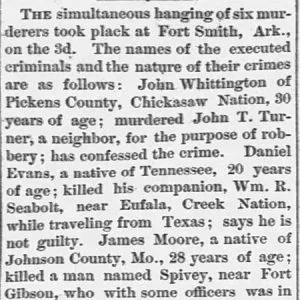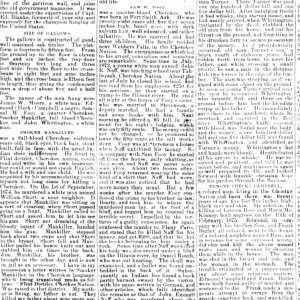calsfoundation@cals.org
Smoker Mankiller (Execution of)
An eighteen- or nineteen-year-old Cherokee man named Smoker Mankiller was one of six prisoners executed at Fort Smith (Sebastian County) on September 3, 1875. He was accused of shooting and then fatally stabbing a white man named William Short a year earlier.
In a September 4, 1875, article, the Arkansas Gazette noted that Mankiller could both read and write in Cherokee and, employing stereotypes, described him as having the “usual Indian stoic indifference” of his tribe. On July 15, the St. Louis Globe-Democrat had given a fuller description, noting that Mankiller was “Medium-sized, full-faced, thick-lipped, [had] coarse hair of intense, dull blackness, face pock-marked and yellowish tinted, dark eyes and countenance apathetic and apparently listless.” At the time of his execution, Mankiller already had a wife and child. The Globe-Democrat noted that despite his young age he was “old in crime,” having murdered a fellow Cherokee four months earlier and been acquitted in a tribal court. The Gazette quoted a letter that Mankiller wrote to his mother, noting that “they” (presumably authorities) had killed his father nine years earlier. Some sources say that he hated all whites, perhaps for this reason.
The details of the case are available in the criminal case files for Fort Smith. On March 11, 1875, a man named William Alnutt asked authorities for the United States District Court for the Western District of Arkansas to arrest Smoker Mankiller and another unknown man for the murder of William Short on or around September 1, 1874. The court issued a subpoena, and Mankiller was arrested in the Cherokee Nation and jailed in Fort Smith on March 25. Soon thereafter, while Mankiller was seriously ill in the jail and unable to attend, the court took the testimony of several witnesses “in order to determine if their presence will be required at a future examination.” John E. Welch, an acquaintance of Mankiller’s, said that he was on his way to the home of William Short’s father, Aaron Short, when he saw three people ahead of him: William Short, Smoker Mankiller, and Mankiller’s cousin, whose name he did not know. Short soon walked away from the others, but Mankiller called out to him, and Short waited for them to approach. Mankiller spoke to him, upon which Short handed him the gun he was carrying, described as an “old fashioned squirrel rifle.” Mankiller then shot Short, and after Short had managed to run fifteen or twenty steps he fell down. Mankiller then approached him and stabbed him in the back five or six times with Short’s own knife. Welch’s story was corroborated by his brother, Richard. Another man, John Holland, testified that he had heard that William Short was missing, and as he approached the Short house the next day to check, he “heard a great crying.” He and Short’s mother and sister and a man named Chris Sizemore went to see what was happening and found Short’s body.
On April 26, Mankiller was brought before the district commissioner, and after the “foregoing evidence [was] interpreted to him,” he was returned to jail to await an appearance before the grand jury. There, he was indicted along with Jim Mankiller and told to appear at the next session of the circuit court, which convened on May 10. Jim Mankiller had not yet been found.
The following day, Judge Isaac Parker demanded the appearance of Bell Te Ses Kah, Dave Rat, and Bill Maclamon. On May 12, Aaron Short was subpoenaed, and the following day three other witnesses were called. On May 25, Mankiller and his lawyers appeared in court, ready and willing to go to trial if they could procure the witness “One Cole,” who would say he and Mankiller were playing cards at the time that Short was killed. As Mankiller was too impoverished to pay for the witness’s procurement, he asked the court to pay the costs. This subpoena was served on May 29.
Mankiller was tried and convicted, the verdict coming in early June. The Globe-Democrat reported, “The Judge’s address was translated to him sentence by sentence, and when told to prepare for death and select a gospel minister to prepare him to meet his doom, he emphatically declared that he wanted no minister to come near him.” Mankiller’s lawyers immediately began to gather testimony in Mankiller’s defense, and by June 12 they had procured six such affidavits. Several of them were intended to challenge John Welch’s testimony. A Cherokee man named Stand Ah-mart-son reported that he knew John Welch in North Carolina and that Welch had murdered a man there and then moved to the Cherokee Nation to avoid prosecution. John Hulsey and John Eagle swore that Welch told them he knew nothing about Short’s murder. Two others, Ahequah Baldridge and John Beanstick, testified that witness Sally Justice was very angry at Mankiller, and since she “could not get satisfaction [against him] in the Nation,” she would testify falsely in support of Welch’s accusations against Mankiller.
On June 25, Mankiller again appeared before the court, asking for a new trial based partly on these affidavits. He also maintained that some of the testimony at his original trial was delivered entirely in English and that no translation was offered so he or his counsel could cross-examine.
In an affidavit submitted on June 26, Mankiller asserted that when he was arrested for killing Short, he had not heard from anyone that he was suspected of the murder and he did not know what the evidence could be, or who the witnesses against him would be. Since his arrest, he had been confined in jail; being young and inexperienced, he did not know what to do. He maintained that he still did not know about the testimony against him at the time of his original trial. He also offered to present new exonerating evidence if granted a new trial at the November term of court. Two witnesses, Lucy Ah-Leach-ah and a man identified only by his surname, Starr, were ready to testify that they saw John and Richard Welch in possession of eleven cattle stolen from Aaron Short. Lucy saw the Welches driving the cattle by her house on the way to Fort Smith, and Starr said that the brothers had put the cattle in his pasture the night after Lucy saw them. Despite this testimony, Parker upheld his original verdict, and Mankiller was sentenced to be hanged on September 3.
According to the Arkansas Gazette, all of the condemned (including Sam Fooy, Daniel Evans, James Moore, John Whittington, and Edward Campbell) “showed the same nerve which has characterized them since their sentence. Not one of them made a confession….Mankiller declared they were innocent.” Having spurned religious counsel in his earlier statements, Mankiller later embraced Presbyterianism and was baptized. In his last words he said: “The law has come on me. I feel very good, only I think the law did not serve me right. Jesus Christ is looking upon the people on earth; the time is put for the Lord to take us away. We all have to die at a certain time….I deny my guilt, or the charge of murder. Parties who brought the charges told falsehoods on me….John and Dick Welch did it….I feel good in the way I am going.”
Jim Mankiller was arrested on August 21, 1875, and appeared in court in November. He asserted that at the time of the crime he was only eleven years old, had gone to visit his aunt (Smoker Mankiller’s mother), had no weapon, and knew nothing of Short’s murder until he was told about it while visiting John Hulsey’s house. When he learned about the murder, he was frightened and returned home immediately. He asked the court to procure several witnesses to testify on his behalf. The case file gives no information on the disposition of the charges against Jim Mankiller.
For additional information:
“The Fatal Trap.” Arkansas Gazette, September 4, 1875, p. 1.
Fort Smith, Arkansas, Criminal Case Files 1866–1900.
“Smoker Man-Killer’s Sentence.” St. Louis Globe-Democrat, July 15, 1875. https://federaldeathpenaltyproject.org/2021/03/07/smoker-mankiller/ (accessed December 15, 2023).
Nancy Snell Griffith
Davidson, North Carolina
 Law
Law Post-Reconstruction through the Gilded Age, 1875 through 1900
Post-Reconstruction through the Gilded Age, 1875 through 1900 Smoker Mankiller Execution Article
Smoker Mankiller Execution Article  Smoker Mankiller and Samuel Fooy Execution Article
Smoker Mankiller and Samuel Fooy Execution Article 



Comments
No comments on this entry yet.